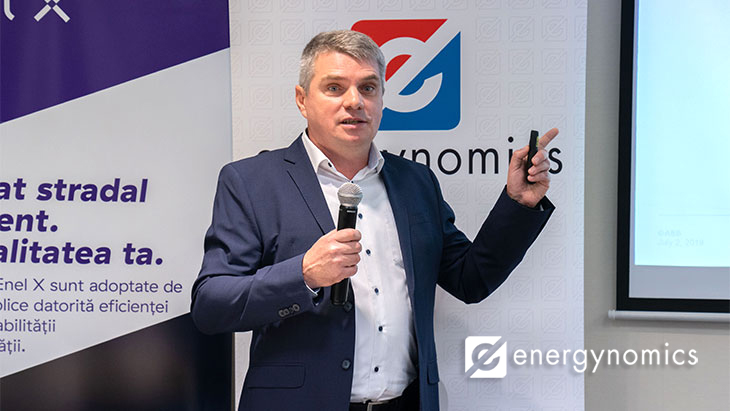ABB Group installed the first charger for electric vehicles in Europe in 2010 and in 2016 created partnerships with vehicle manufacturers. Last year, the company launched the 360 kW charger, which will also be used in Romania, said Constantin Ichimoaei, executive manager at ABB Romania, at the conference “Sustainable Communities – Iasi”, organized by Energynomics and SmartiCity.
According to some studies cited by the ABB representative, there are three mega trends at global level. The first is urbanization, so that by 2050 it is estimated that 70% of the world’s population will live in cities. Second, by 2040, electricity will contribute more than 30% of the energy mix, but this percentage could be higher given the global energy situation. Also, by 2025, more than 7.5 billion people will be connected to the Internet.
A smart city is safe, prosperous and sustainable, according to ABB. Constantin Ichimoaei detailed the model of a city of the future, based on an inclusive society whose members are engaged and connected.
“The future is already here,” explained Ichimoaei. “Factories of the future already exist in Romania, we have implemented robots and robotic automation lines. We have already installed in the energy system in Romania equipment with communication, with SCADA systems, with remote management systems that talk to each other and exchange information in real time. Including in the LEIER-Brikston factory in Iași, in the general picture there is an intelligent system located there for further developments to allow the visualization of energy flows. Many times, when implementing, we go beyond the client’s requirements and introduce those elements that enable connectivity and software integration. To conclude, 5 years ago, in the area of electric mobility we were only talking about charging stations and management software. Now, together with the car manufacturers, we were able to get the vehicle and the charging station to ‘talk’, identify each other and exchange information about the charging process once connected,” explained the ABB representative.
According to Ichimoaei, considering the extremely high share of energy consumption in the society of the future, it is necessary to upgrade the infrastructure, especially to provide charging power for depots, commercial fleets, large parking lots and charging hubs. Thus, the charging service must match the charging demand and application.
“We have the capacity to produce, deliver and honor our current and future contracts. Everyone is talking about EV chargers. The main issue we will be talking about in two years, I hope not sooner, is the transport network. Distribution systems, transformers and the low-voltage network will be the most likely to be upgraded as a result of the load on the grid,” added Ichimoaei.
“We were trailblazers and got involved in the e-mobility sector as early as 2014, because we saw the trend, and the trends in the automotive industry merge at a certain point with those in the energy industry. The automotive industry is now focused on electrification, and the energy industry on decarbonization, digitalization and decentralization,” Ichimoaei said.
As of July, the company had over 30,000 fast chargers up to 230 kW and 650,000 AC units installed and running globally. Investing in smart infrastructure and smart cities is crucial for increasing quality of life and sustainable business, but this development must be done in a planned way. One of the challenges of this approach is the impact of electric vehicle charging stations on the electricity grid.
DOWNLOAD THE PRESENTATION OF CONSTANTIN ICHIMOAEI
ABB has an electric vehicle charger factory in Italy with a capacity of more than 10,000 fast charging units per year. A little while ago, the company announced a similar investment in the US.
The conference “Sustainable Communities – Iasi” was organized by Energynomics and SmartiCity with the support of our partners: ABB, Eaton Electric, Enel X, ENGIE Romania, Flash Lighting Services, Geminox, REI Grup.
